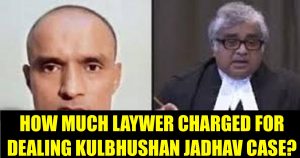
Kulbhushan Jadhav Verdict: Lawyer Harish Salve Took Just Re 1 For Case, Sushma Swaraj Lauds Him For India’s Win!
In the month of April, a rare move was taken by Pakistan’s Field General Court Martial (FGCM) under the Pakistan Army Act (PAA) which has resulted in awarding the death sentence to the alleged Indian spy Kulbushan Yadav.
But the Indian military force didn’t agree with this kind of cruel gesture from the neighboring country Pakistan and it went a step ahead registering a case in the International Court of Justice (ICJ) for the right judgement in Kulbhushan Jadhav case.
And finally today, India has registered a major diplomatic, moral and legal victory against Pakistan at the International Court of Justice (ICJ) in Kulbhushan Jadhav case.
Yes, ICJ asked Pakistan not to execute alleged spy Kulbushan Jadhav pending its final decision and inform it of the steps being taken to implement the order.
Soon after the ICJ’s verdict came out, External Affairs Minister took to Twitter to pay thanks to lawyer Harish Salve who represented India at ICJ in Kulbhushan matter.
We are grateful to Mr.Harish Salve for presenting India’s case so effectively before ICJ.
— Sushma Swaraj (@SushmaSwaraj) May 18, 2017
And what’s so important and surprising to know about this case is that eminent lawyer Harish Salve charged us Re 1 as his fee for this case.
Not fair. #HarishSalve has charged us Rs.1/- as his fee for this case. https://t.co/Eyl3vQScrs
— Sushma Swaraj (@SushmaSwaraj) May 15, 2017
The fee amount was confirmed by Sushma Swaraj.
ICJ verdict on Kulbhushan
“This court unanimously decides that Pakistan shall take all measures at its disposal so that Kulbushan Jadhav is not executed pending a final decision of this court in the matter. It also unanimously decides that the court must be told of the measures Pakistan takes to implement this order,” ICJ President Ronny Abraham said in the operative portion of the order which he read out in the open court for nearly 30 minutes.
It also said that Pakistan should have given India consular access to Kulbhushan Jadhav, rejecting Pakistan’s argument that a person convicted of espionage is not entitled to it.
In an emergency hearing on Monday, India had accused Pakistan of “egregious violations of the Vienna convention” by denying Mr Jadhav, a former navy officer, of legal counsel and consular access and refusing to reveal the charges or evidence against him.
As per reports, 11 judges today agreed with India’s stand that there is urgency in the case, and noted that Pakistan had given no assurance that Mr Jadhav would not be executed till its verdict.
Mr Jadhav, 47, was arrested in March 2016 and Pakistani officials claimed he had confessed to spying for Indian intelligence services. He was sentenced to death by a Pakistani military court last month.
Mr Jadhav was “an innocent Indian national, who, incarcerated in Pakistan for more than a year on concocted charges has been held incommunicado… and faces imminent execution,” India told the tribunal.
Hours later, Pakistan told the world court that the execution was not imminent and that Mr Jadhav had time at least till August for legal remedies. Its representative also accused India of “political grandstanding” and told the court Mr Jadhav “has confessed to having been sent by India to wage terror on the innocent civilians and infrastructure of Pakistan”.
The two countries are battling it out in the international court amid a sharp escalation in tension over ceasefire violations by Pakistan, terror attacks in Jammu and Kashmir and the recent mutilation of two Indian soldiers by Pakistanis.
The last time India and Pakistan took a dispute to the ICJ was in 1999 when Islamabad protested against the shooting down of a Pakistani navy plane that killed 16 people. In that case, the tribunal decided it was not competent to rule in the dispute and closed the case.